
The magic of young love can have deadly consequences in 36 Moons, a new work of historical fiction by Chris Guest. Set near the turn of the 17th century in the countryside of Salem, Massachusetts, this tangled tale of love, innocence, and puritanical suspicion is a shadowy escape.
Fabian is just coming into manhood, and while his family has certain expectations for his romantic future, fate has other plans for the handsome farm boy. When a beautiful young stranger named Emma Radcliffe appears on his land, he is captivated in an instant, sending Fabian down an eye-opening, life-changing, and possibly heartbreaking path.
As the story is set in a dangerous place and time in history for an artistic, free-thinking and rule-breaking seventeen-year-old girl, it doesn’t take long for readers to suspect where this plot will lead. Guest is a patient storyteller, however, and notably sensitive to the awkwardness of young love and courtship, even in a setting three centuries ago.
The timelessness of this central relationship makes it compelling to watch as it unfolds, but the budding love is also clouded by a foreboding shadow – there is sickness spreading and panic growing in Salem, with blame being cast at young “witches.” The secret nature of the illicit connection between Fabian and Emma hints at the book’s inevitable conflict, imbuing much of the prose with an underlying air of suspense.
The novel allows readers to step back into an infamous time period, when suspicion spread like disease between neighbors and friends alike. Telling the story through the eyes of young people provides a slightly brighter view, untainted by the historical weight that is naturally put on this era and locale. The momentum of the story is addicting, with each chapter immersing readers further into the drama and intrigue that swirls around this cursed corner of Massachusetts.
As can often be the case in historical fiction, there are some inconsistencies in the language, particularly when it comes to the appearance of modern idioms or phrasing. When an author works hard to strictly represent an older style of language, even small errors become glaringly obvious. Additionally, the writing sometimes moves at a fast clip, with characters entering and leaving scenes rapidly, making it difficult to track or digest all the condensed events of a chapter. On the other extreme, there are also long expositional passages or sections of internal monologue, and while these are insightful for character development, they can slow down the pace, while also feeling like they’re cutting a corner in the natural narrative flow.
Generally, the language is undecorated and declarative, without much nuance or need for interpretation, which makes this a relatively easy read, even with its colloquial phrasing and verbiage. Despite the apparent simplicity, this is far from a superficial story; the prose dives deep into the insidious nature of faith and fear, the breakable bonds of family, and the importance of thinking for oneself.
Aside from some small critiques, 36 Moons is an expressive, charming, and well-researched novel that goes far beyond witches and pyres, revealing an author with a deep well of compassion who embraces youthful wonder with ease.
Book Links
STAR RATING
Design
Content
Editing
Get an Editorial Review | Get Amazon Sales & Reviews | Get Edited | Get Beta Readers | Enter the SPR Book Awards | Other Marketing Services























Leave A Comment